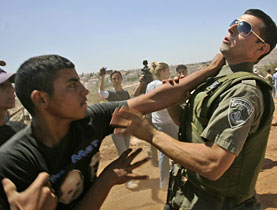
Seeking common ground in the Promised Land

Sixty years after the creation of the state of Israel, the conflict with the Palestinians appears to be no closer to a solution.
Church leaders and theologians from around the world have gathered in Bern this week to consider the religious roots of the conflict and how they can promote a peaceful outcome.
With more than 100 participants from Europe, the Middle East, America, Asia and Africa the event is one of the most important ecumenical events ever staged by the Geneva-based World Council of Churches.
“Not since the time of the struggle against South African apartheid in the 1970s and 80s has the WCC had such an overwhelmingly positive response to the invitation to come to a conference,” said the council’s general-secretary, Samuel Kobia, in his welcome speech.
A challenge for the churches in promoting peace is that the conflict is played out in a land that different religions consider holy. Religious Jews believe the land of Israel was promised to them by God, while Christians and Muslims who have lived in the former Palestine for centuries cannot accept that claim.
But while religion plays a part in the conflict between Arabs and Jews, conference participants believe the real causes are political and cultural. “If you have a political take you can find passages in the holy texts that will justify your agenda,” said Ulrike Bechmann, a professor of religious studies at Graz University in Austria.
“But if you keep reading, you see that that is wrong.”
Common action
One of the main goals of the conference, organisers said, was to deepen understanding of the biblical promises concerning the land and its peoples. They argued that different approaches to biblical and theological issues should not prevent common action for a just peace.
“God gave us a mandate to pursue peace and understanding, and that’s for all of us,” said Thomas Wipf, president of the Federation of Swiss Protestant Churches, which is hosting the event.
Elias Chacour, the Archbishop of Galilee of the Melkite Greek Catholic Church, told swissinfo what this meant for him in practice.
Seeing the lack of educational opportunities for Arab youths in Israel beyond the 8th grade, in 1982 Chacour set up a school open to all local children, regardless of religious affiliation. The college now caters for pupils for kindergarten through to university level.
“Out of 4,500 students at the school in Ibillin, 60 per cent are Muslim boys and girls, we have around 100 Jewish kids. Among the faculty members we have 32 Jews and over 80 Muslims.
“That doesn’t constitute any problem. It is normal that we be together: Jews, Christians, Muslims and Druze. Because separation is an inclination to enmity and to violence.”
“Living together is already peace. Peace goes beyond tolerance towards a welcoming acceptance of others as an enrichment to us,” the archbishop said.
Hopes
For conference participant Harvey Cox, a professor of divinity at Harvard in the United States, the main message to put across was that the situation in the holy land is “not hopeless”.
“One hears all the time in the United States what can you do, these people have been at each others throats for centuries and centuries, and there’s a cynicism that develops, a withdrawing.
“The main thing is to get away from the fatalism.”
Chacour said attitudes were changing in Israel, with both Jews and Palestinians “fed up with the ongoing violence on both sides”.
“This is the big hope: they are looking for something else. The feeling of the population on both sides is that the only solution cannot be military, it has to be acceptance of the other side as partners.”
swissinfo, Morven McLean and Tim Neville
Israel population: 7.1 million
1.6 million are Arabs with Israeli citizenship
Size: 20,770 square kilometres, about half the size of Switzerland
The World Council of Churches (WCC) is a Geneva-based organisation that promotes Christian unity across its many denominations.
The group is not immune to political rifts. In the early 1960s three Dutch Reformed churches in South Africa left the council amid differences over apartheid.
The council was founded in 1948 in Amsterdam with 147 churches. Today it includes 349 churches in 110 countries and represents more than 560 million Christians worldwide. In 2007 it had a budget of nearly SFr40 million ($35 million).
The Roman Catholic Church has never applied to become a member.
The WCC seeks to voice the Christian point of view before international bodies, such as the United Nations.
The WCC organises programmes to help AIDS victims and refugees.
1897: Zionists meet in Basel, Switzerland, to discuss their own state.
1917: Balfour Declaration promotes a national home for Jews in Palestine.
1948: State of Israel declared. Arab armies invade.
1967: Six-Day War. Israel captures Gaza, the Sinai, the Golan Heights and Jerusalem. UN calls for return of territory.
1973: Yom Kippur War leads to Arab oil embargo.
1974: Militants kill 11 Israeli athletes at Olympic Games in Munich.
1979: Egypt and Israel make peace.
1982: Palestine Liberation Organisation forced out of Lebanon.
1993: Oslo accords – Palestinians recognize Israel. Israel uproots Jewish settlers.
2003: US creates “roadmap” toward Palestinian state.
2006: Hamas elected to lead Palestinian authority. West withholds aid. Fighting begins with rival group Fatah.
2007: Hamas-Fatah ceasefire. Palestinians agree to form new government.

In compliance with the JTI standards
More: SWI swissinfo.ch certified by the Journalism Trust Initiative



























You can find an overview of ongoing debates with our journalists here . Please join us!
If you want to start a conversation about a topic raised in this article or want to report factual errors, email us at english@swissinfo.ch.